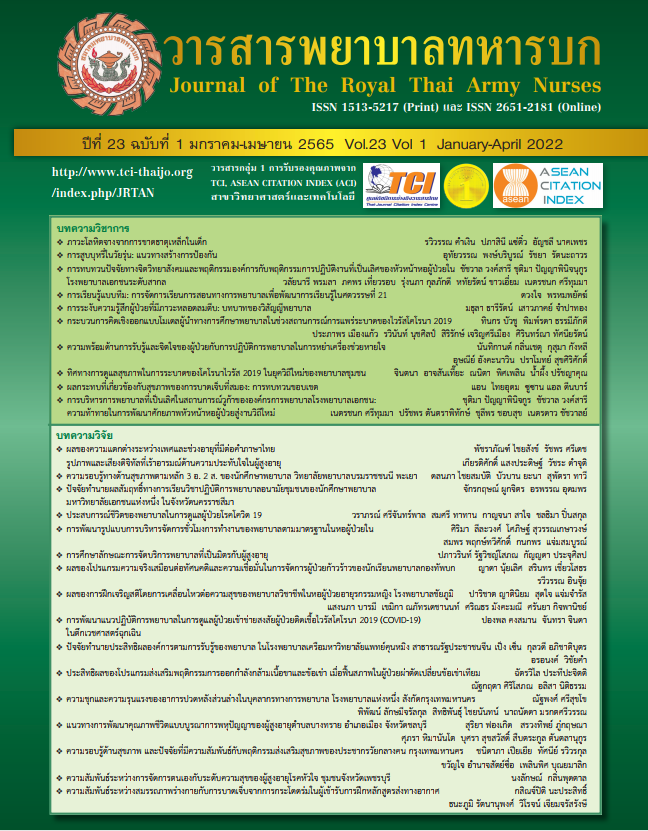Transformative Learning for Humanized Nursing Care Behavior of Nursing Students for Severe Psoriasis Patients
Keywords:
Transformative learning, Humanized nursing care, Psoriasis patients, Nursing studentsAbstract
This study was the Qualitative research. The purpose of this research was to study the composition and procedure for transformative Learning for humanized nursing care behavior of nursing students. The participants were the 30 of third-year nursing students. These students were practiced to care the severe psoriasis disease. The data were collected by field notes, observe as participant, nursing practical behaviors, reflection writing of the students, nursing care conferences and Non-Structured interview about transformative learning affected of humanized health care behaviors. The analysis of data was using content analysis and examine the correction of core consistency analysis with the participants. The results showed there were the factors that affected the transformative learning for humanized nursing care. They consisted of: 1) The good role models in nursing practice were the important components of learning. 2) The humanized nursing care behaviors were affected by deep listening, perceive patients suffering, Don’t judge and bias for the patient behaviors, put yourself in their shoes, realizing the values of work and perception how it value to the others. Moreover, the creative activities were designed based on the understanding of patients’ problems. These activities led to humanized nursing care.
Downloads
References
Intawat J, Bundasak T, Jangasem N. The humanized care paradigm: the chapter of Gilanadhamma camp. The Journal of MCU Peace Studies. 2017;5(2),376-387. (in Thai)
Praboromarajchanok Institute. Guideline on Development of the Identity of Graduated Nurses of Praboromarajchanok Institute. Nonthaburi: Yuttarin printing; 2013. (in Thai)
Tongprateep T. Spirituality: A dimension of nursing. Bangkok: Kuakarun College of nursing. Medical service Department; 2006. (in Thai)
Wasi P. (2552). The humanized hearts of Thai nurses for humanity: The connection of care for covered all of Thailand. Khonkean: Center For Research And Development In Community Health System. Faculty of Nursing, Khon Kaen University; 2009. (in Thai)
Merzirow J. Transformative Learning: Theory to practice. New directions for adult and continuing education. 1997;74, 5-12.
Merzirow J. Learning as transformation: Critical perspective on a theory in progress. The Jossey-Bass Higher and Adult Education Series. San Francisco: Jossey-Bass; 2000
Vatcharavongvan P. Transformative learning and medical teaching. Thammasat Medical Journal. 2014; 14(3),449-459. (in Thai)
Prajankett O, Transformative Learning: Nursing Education Perspective. Journal of the Royal Thai Army Nurses. 2014;15(3),179-184. (in Thai)
Intana J, Srimahunt K, Chaiyoyingyong R, Meebunmak Y, Kitnopkiat K. Health service: understanding of humanized care. 1sted. Ratchaburi: Boromrajonani College of Nursing Ratchaburi; 2014. (in Thai)
Kosolchuenvijit J. Caring: Central of humanistic care. Journal of Boromarajonani College of Nursing, Bangkok. 2013;29(2),134-141. (in Thai)
Bisalbutra P. Dermatosis and stress. Moh-Chao-Ban Magazine. 2010; (375):6-7. (in Thai)
Boon-Art N. An Effect of Buddhist PsychologyBased Humanized Healthcare Program. Journal of Graduate Studies Review. 2019;15 (1),115-127. (in Thai)
Sirisoparuk S, Oumtanee A. Experience of Being a Professional Nurse Providing Humanized Care for Patients. Journal of the Royal Thai Army Nurses. 2014;15(2), 289-297. (in Thai)
Downloads
Published
How to Cite
Issue
Section
License
Copyright (c) 2022 Journal of The Royal Thai Army Nurses

This work is licensed under a Creative Commons Attribution-NonCommercial-NoDerivatives 4.0 International License.
บทความหรือข้อคิดเห็นใดใดที่ปรากฏในวารสารพยาบาลทหารบกเป็นวรรณกรรมของผู้เขียน ซึ่งบรรณาธิการหรือสมาคมพยาบาลทหารบก ไม่จำเป็นต้องเห็นด้วย
บทความที่ได้รับการตีพิมพ์เป็นลิขสิทธิ์ของวารสารพยาบาลทหารบก
The ideas and opinions expressed in the Journal of The Royal Thai Army Nurses are those of the authors and not necessarily those
of the editor or Royal Thai Army Nurses Association.






